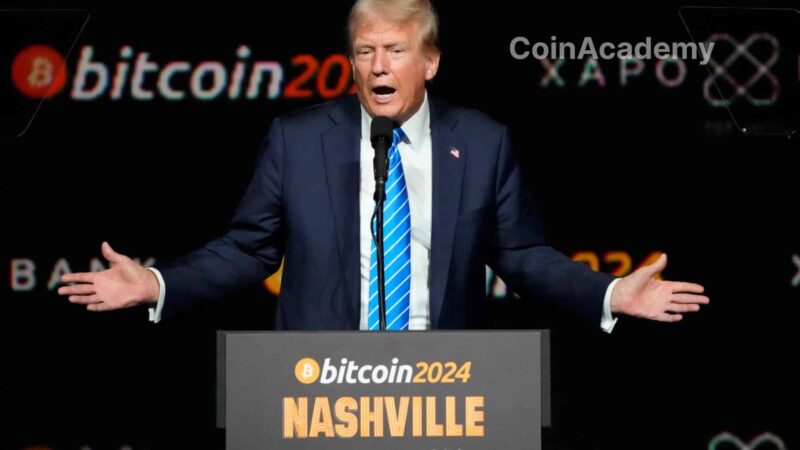The Coin Weekly is the must-read for staying up to date with the latest crypto, NFT, Metaverse & Web3 news of the week! 📰
MakerDAO Wants to Adopt Solana’s Code for Its Blockchain
As MakerDAO enters the fifth phase of its “Endgame” project, cofounder Rune Christensen is seriously considering using Solana’s code to create a new blockchain called NewChain.
This strategic choice aims to provide more resilience to the MakerDAO protocol, particularly against governance attacks and technical failures. Christensen suggests that Solana’s open-source code could be an effective solution, avoiding the cost and time required to build infrastructure from scratch.
The choice of Solana has received a favorable reception from key players in its ecosystem, including its co-creator Anatoly Yakovenko.
While other alternatives like Cosmos have been considered, Solana is preferred due to its advantages such as efficiency, speed, and a flourishing community of developers despite recent challenges.
However, this choice has raised questions in the MakerDAO community, particularly regarding the non-consideration of Ethereum as a viable option for the project’s fifth phase.
It is also worth noting that the choice of Sei network has also been considered.
SEC Classifies Impact Theory’s NFTs as “Securities”
In an unprecedented move, the U.S. Securities and Exchange Commission (SEC) has dealt a blow to the blockchain and digital asset sectors by classifying Impact Theory’s NFTs as unregistered securities.
This regulatory action, the first of its kind against non-fungible tokens, has placed NFTs under the jurisdiction of the SEC, resulting in penalties and the obligation for Impact Theory to refund investors.
Impact Theory initially marketed its NFTs as digital collectibles, raising nearly $30 million.
However, the SEC highlighted that the company had encouraged investors to consider their purchase as a potentially profitable investment. As a result, the SEC imposed fines exceeding $6.1 million and ordered Impact Theory to destroy all remaining NFTs in its possession, while establishing a fund for investor refunds.
Digital Currency Group (DCG) Comes to Genesis’s Aid in Debt Crisis
Following a financial turmoil due to FTX’s collapse, Genesis Global Holdco, a subsidiary of Digital Currency Group (DCG), has reached a new agreement with its parent company to resolve its colossal debt crisis.
Severely indebted, with $3.6 billion and engaged in bankruptcy proceedings under Chapter 11 since January 2023, Genesis faced significant repayment deadlines, including $630 million in 2023 and $1.1 billion in 2032.
To rescue Genesis from this crisis, Digital Currency Group has decided to assist them once again by securing two loans totaling nearly $1.16 billion.
This rescue plan also includes a payment of $275 million in four installments. These funds are expected to restore between 65-90% of funds to Genesis’s creditors. However, it should be noted that this agreement is still at the preliminary stage, and some details remain to be finalized between the two parties.
Preliminary Victory for Grayscale: Court of Appeals Opens Door to Spot Bitcoin ETFs, but SEC Can Respond
The U.S. District of Columbia Circuit Court of Appeals has overturned the previous decision by the Securities and Exchange Commission (SEC) that rejected Grayscale Investments’ proposal for a Bitcoin spot ETF.
This court decision has been widely celebrated within the crypto community. However, Craig Salm, the legal director of Grayscale, took a measured approach, emphasizing that the victory was mainly based on the principle of equal treatment under U.S. law.
While the outcome of this decision leaves room for cautious optimism, the SEC could still change tactics. Legal experts and industry analysts express reservations about the SEC’s next steps, which could include introducing new grounds to once again reject Grayscale’s proposal.
This move would then lead to another cycle of lengthy and costly legal battles, and industry observers are eagerly awaiting the SEC’s response to fully understand the implications of this judicial decision.
X Obtains Crucial Licenses and Positions to Transform the Payment Landscape
X, Elon Musk’s social network (formerly Twitter), has reached a significant milestone by obtaining money transmitter licenses in seven U.S. states, including Rhode Island.
These licenses allow X to align itself with major payment platforms like PayPal and Venmo and echo Musk’s ambitions to transform X into an all-in-one or super app, similar to WeChat.
Beyond social media features, X seems poised to offer a full range of payment services, including cryptocurrency.
These licenses also cover traditional and electronic payments, similar to the services offered by PayPal and Western Union.
According to the Rhode Island Department of Business Regulation (DBR), these licenses are essential for any company offering money transmission, electronic transfer, and crypto custody services.
Obtaining licenses in multiple states underscores Musk’s strategy of turning X into a multi-service platform far beyond its initial role as a social network. With these licenses in hand and Musk’s favorable stance towards crypto.
Nexo Unveils Crypto Debit Card with Up to 9% Annual Yield
Nexo, the decentralized lending platform, is launching a crypto-exclusive Mastercard for residents of the European Economic Area (EEA).
This innovative card allows transactions in various currencies, including the euro, U.S. dollar, and pound sterling, across a multitude of merchant terminals. It goes a step further by offering up to 9% interest on balances, positioning the card as a highly attractive financial tool.
Nexo’s Mastercard also stands out for its credit facilities, backed by cryptocurrencies like Bitcoin, and offering up to 2% cashback.
On the ATM front, there is a monthly withdrawal limit of 10,000 euros at ATMs.
The card advocates for full transparency, eliminating monthly fees, inactivity fees, and exchange fees up to a certain threshold. After passing KYC verification, users receive both a virtual and physical card, compatible with digital payment ecosystems such as Apple Pay and Google Pay, making this Mastercard an all-in-one crypto financial solution.
News in Brief
- Ethereum staking services oppose Lido for decentralization of the network
- The Solana project, Clockwork, shuts down
- Circle set to launch USDC on Base next week
- Robinhood and Jump Trading end their partnership
- Coinbase introduces crypto job listings on X with a new partnership
- Robinhood is the fifth-largest holder of Ethereum worldwide
- Robinhood buys back shares sold to SBF for $605.7 million
- FTX user data breach reveals more than initially acknowledged




